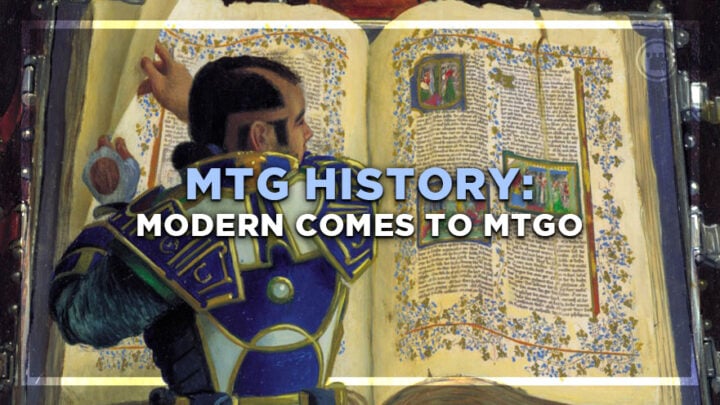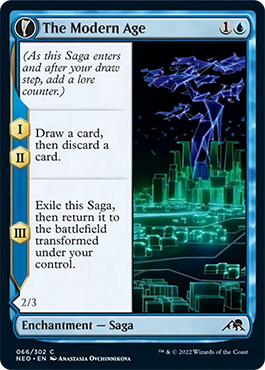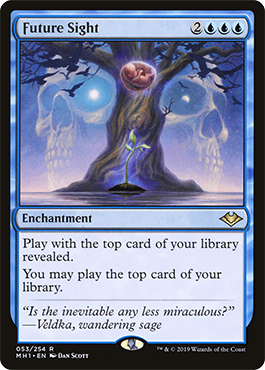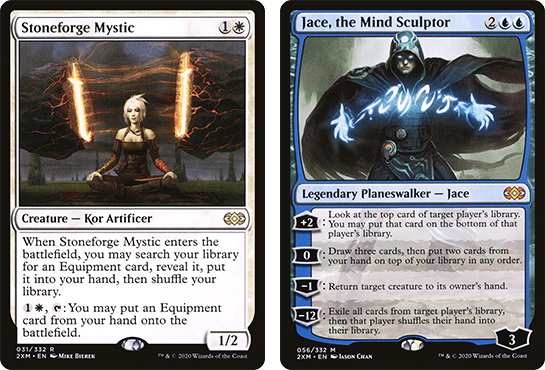Nizzahon looks at a significant event on this day in MTG history. On May 19th, 2011, Modern was first introduced to the world on MTGO!
Welcome to another edition of “On This Date in Magic History.” The first two articles in this series focused on Magic way back in the 1990s, but today we’re going to take a look at some more recent Magic History. In particular, we’ll take a look at when Modern was added to Magic Online on May 19th, 2011. This led to Modern becoming one of the main ways people play Magic, even today! With the recent introduction of the Explorer format, it seems like a particularly good time to take a look at the genesis of one of Magic’s other formats.
What is Modern?
Modern is a non-rotating format that features cards from Eighth Edition forward. The name “Modern” comes from the fact that Eighth Edition was the set that introduced the “modern” card frames that we are used to today. These days, cards from the Modern Horizons sets are also legal in Modern. Modern is well supported by Wizards of the Coast. There have been many Modern Grand Prixs and Pro Tours. It is also one of the main constructed formats on Magic Online, alongside Legacy and Vintage.

Right – Ravenous Rats from Eighth Edition featuring the “Modern” border we know today.
Modern before Magic Online
While Modern wasn’t available on Magic Online until May 19th, 2011, it wasn’t the very first time people were introduced to the format. Instead, it was first introduced at the 2011 Magic Online Community Cup. This was part of a series of invitational tournaments held between 2009 and 2015. Various professional players and content creators represented the community in a competition against the Magic Online team. These events had some pretty wild one-off formats, including stipulation drafts and a Magic equivalent of Iron Chef called “Ironroot Chef.” In 2011, Modern was introduced as one of the formats at the Community Cup. However, from the beginning, it was clear Modern wasn’t just a format that would be played at the Cup and nowhere else. Wizards was treating the Community Cup as a testing ground to see what the format would look like, and they could also gauge the public’s interest in the new format.
In the end, the feedback was incredibly positive. Players were really interested in this new format, especially as interest in the Extended format was waning. Extended was a rotating format that featured the last several years’ worth of cards, and people had largely grown tired of the fact that the format wasn’t entirely “eternal.” In other words, what was the point in having a second rotating format where eventually your cards would be useless, just like in Standard? Modern solved that problem. You were still able to use cards from several years ago, but you could be confident that those cards wouldn’t rotate out of the format! It also provided a non-rotating format that didn’t have as high of a barrier of entry as Legacy and Vintage.
Modern Comes to Magic Online
The public support for this new format led to Wizards of the Coast introducing Modern as a digital-only format on Magic Online on May 19th, 2011. That’s right, digital-only formats aren’t an entirely new thing! Introducing the format on Magic Online allowed Wizards of the Coast to really gauge the format’s popularity, as they could get detailed data about the format. Once it was available on Magic Online, it was clear that the format was incredibly popular. Meanwhile, the player base for Extended was disappearing. This led to a major announcement about the futures of both Modern and Extended..
Modern Becomes a Paper Format
On August 12th, 2011, Tom Lapille’s article “Welcome to the Modern World” announced that Modern was officially going to become a paper format. That would have been a big announcement on its own, but it didn’t stop there! Modern also immediately became a premiere format. In other words, there would be major sanctioned Modern events, including a Pro Tour scheduled less than a month after the announcement! Pro Tour Philadelphia (September 2nd-4th, 2011) was originally announced as an Extended Pro Tour, but Tom’s announcement changed the event’s format to Modern. According to Tom’s article, the main reason for this was the dominance of Stoneforge Mystic and Jace the Mind Sculptor decks in Magic’s other formats at the time, including Extended. People were tired of seeing those cards by this point. They wanted to give people a brand new format to play instead of continuing with those types of decks. To make sure those two cards wouldn’t be part of the format, they were banned.
In addition to the news about Pro Tour Philadelphia, the article also announced that Modern would be played at the 2011 World Championship, the 2011 World Magic Cup and some 2012 Grand Prixs. Modern had officially arrived as a premiere format.
At the time, it seemed like Extended and Modern might coexist. But it didn’t play out that way. In fact, Pro Tour Philadelphia’s shift from Extended to Modern marked the unofficial end of Extended. While the format wasn’t officially retired until August 7th of 2013, the format never got another premiere event after this. Meanwhile, Modern exists to this day as one of the most popular ways to play Magic!
Parting Words
It is quite interesting to think about the beginning of Modern and the end of Extended, especially as we see new formats continually created, with both Alchemy and Explorer both introduced within the last several months. Will the success of those formats lead to the potential end of others? Or will those formats be able to find enough success in the first place to continue to exist? It will be interesting to see how things play out this time around. One thing is for sure – Magic’s formats are constantly changing!
Thanks for reading, and I’ll be back next week with a look at another important event in Magic history!

Jacob has been playing Magic for the better part of 24 years, and he especially loves playing Magic’s Limited formats. He also holds a PhD in history from the University of Oklahoma. In 2015, he started his YouTube channel, “Nizzahon Magic,” where he combines his interests with many videos covering Magic’s competitive history. When he’s not playing Magic or making Magic content, he can be found teaching college-level history courses or caring for a menagerie of pets with his wife.





